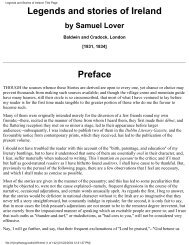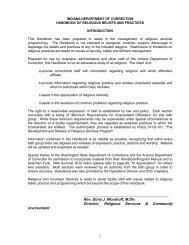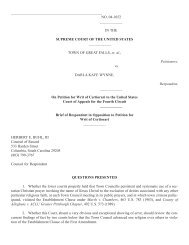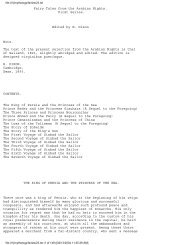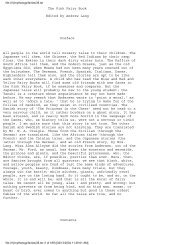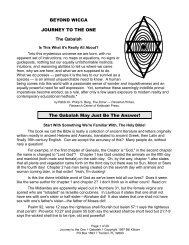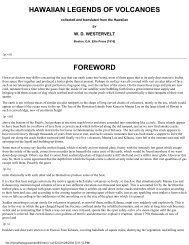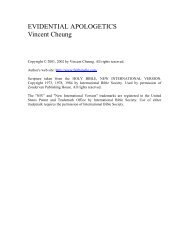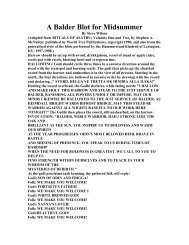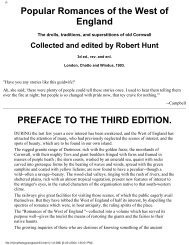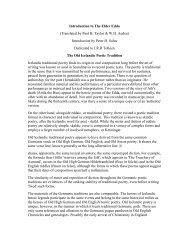Tales and Traditions of the Eskimo - Alternative Religions ...
Tales and Traditions of the Eskimo - Alternative Religions ...
Tales and Traditions of the Eskimo - Alternative Religions ...
Create successful ePaper yourself
Turn your PDF publications into a flip-book with our unique Google optimized e-Paper software.
<strong>Tales</strong> <strong>and</strong> <strong>Traditions</strong> <strong>of</strong> <strong>the</strong> <strong>Eskimo</strong> - Title Page<br />
Of every seal caught at a winter station during <strong>the</strong> whole season <strong>of</strong> <strong>the</strong>ir dwelling in <strong>the</strong> winter-houses,<br />
small pieces <strong>of</strong> flesh, with a proportionate share <strong>of</strong> <strong>the</strong> blubber, were distributed among all <strong>the</strong><br />
inhabitants; or if insufficient for so many, <strong>the</strong> housemates first got <strong>the</strong>ir share. Nobody was omitted on<br />
<strong>the</strong>se occasions, <strong>and</strong> in this way not <strong>the</strong> very poorest could want food <strong>and</strong> lamp-oil so long as <strong>the</strong> usual<br />
capture <strong>of</strong> seals did not fail. Besides this general distribution, every man who had taken a seal used to<br />
invite <strong>the</strong> rest to partake <strong>of</strong> a meal with him. It must, however, be understood, that where <strong>the</strong> population<br />
<strong>of</strong> a place exceeded a certain number, or at times when <strong>the</strong> seals were very plentiful, this sharing <strong>of</strong> flesh<br />
<strong>and</strong> blubber, ei<strong>the</strong>r by distribution or by feasting, would probably be limited, in <strong>the</strong> first case, to perhaps<br />
some <strong>of</strong> <strong>the</strong> nearest houses or relatives.<br />
Beyond <strong>the</strong> confines <strong>of</strong> such places as were already inhabited, every one was at liberty to put up his house<br />
p. 28 <strong>and</strong> go hunting <strong>and</strong> fishing whenever he chose. Not even where o<strong>the</strong>rs had first established a<br />
fishing-place, by making weirs across a river, would any objection be made to o<strong>the</strong>r parties making use<br />
<strong>of</strong> <strong>the</strong>se, or even injuring <strong>the</strong>m.<br />
Any one picking up pieces <strong>of</strong> driftwood or goods lost at sea or on l<strong>and</strong> was considered rightful owner <strong>of</strong><br />
<strong>the</strong>m; <strong>and</strong> to make good his possession, he had only to carry <strong>the</strong>m up above high-water mark <strong>and</strong> put<br />
stones upon <strong>the</strong>m, no matter where his homestead might be.<br />
If a seal was harpooned <strong>and</strong> got <strong>of</strong>f with <strong>the</strong> harpoon sticking in it, <strong>the</strong> first striker lost his right to it as<br />
soon as <strong>the</strong> hunting-bladder became detached. It <strong>the</strong>n became <strong>the</strong> property <strong>of</strong> whoever found <strong>and</strong> finally<br />
killed it. This would take place when <strong>the</strong> animal had been hit with <strong>the</strong> large harpoon <strong>and</strong> <strong>the</strong> hunting-line<br />
snapped, while <strong>the</strong> small harpoon or bladder-arrow has <strong>the</strong> bladder attached to it. But if <strong>the</strong> animal ran far<br />
away with <strong>the</strong> bladder-arrow, <strong>the</strong> first hunter also lost his claim, just as if <strong>the</strong> bladder had been wanting.<br />
The weapons attached to <strong>the</strong> animal were restored to <strong>the</strong> proper owner when he announced himself.<br />
Any o<strong>the</strong>r kind <strong>of</strong> goods found were considered <strong>the</strong> property <strong>of</strong> <strong>the</strong> finder.<br />
If two hunters at <strong>the</strong> same time hit a bird or a seal, it was divided into equal parts with <strong>the</strong> skin attached.<br />
But if this happened with a reindeer, <strong>the</strong> animal belonged to <strong>the</strong> one whose arrow had reached nearest <strong>the</strong><br />
heart, <strong>the</strong> o<strong>the</strong>r only getting part <strong>of</strong> <strong>the</strong> flesh.<br />
All kinds <strong>of</strong> game or animals which happened to be rare, on account <strong>of</strong> <strong>the</strong>ir size or o<strong>the</strong>r unusual<br />
circumstances, were more than ordinary species considered common property. Of walrus <strong>and</strong> <strong>the</strong> smaller<br />
cetaceous animals, in localities where <strong>the</strong>y were rarely found, <strong>the</strong> killer only took <strong>the</strong> head <strong>and</strong> tail, <strong>the</strong><br />
remainder being given up to public use. This was also <strong>the</strong> case on <strong>the</strong> first capture <strong>of</strong> such animals as<br />
only appeared at certain seasons, or p. 29 with any animal caught during times <strong>of</strong> long want <strong>and</strong> bad luck<br />
to <strong>the</strong> hunters. But if an animal <strong>of</strong> <strong>the</strong> largest size, more especially a whale, was captured, it was<br />
considered common property, <strong>and</strong> as indiscriminately belonging to every one who might come <strong>and</strong> assist<br />
in flensing it, whatever place he belonged to, <strong>and</strong> whe<strong>the</strong>r he had any share in capturing <strong>the</strong> animal or<br />
not. The flensing was also managed without any order or control; <strong>and</strong> if any one happened to wound<br />
ano<strong>the</strong>r on such an occasion, he was not held answerable for it.<br />
In South Greenl<strong>and</strong>, where bears are rarely seen, it is said that, on a bear being killed, it belongs to<br />
whoever first discovered it, setting aside altoge<strong>the</strong>r <strong>the</strong> person who killed it.<br />
When no seals or o<strong>the</strong>r larger animals were brought home to a house, those families who were best <strong>of</strong>f<br />
for provisions generally invited <strong>the</strong> o<strong>the</strong>r housemates, but not <strong>the</strong> place-fellows, to partake <strong>of</strong> <strong>the</strong><br />
file:///I|/mythology/american indian/24/24.html (24 <strong>of</strong> 317) [01/24/2004 8:57:48 AM]



